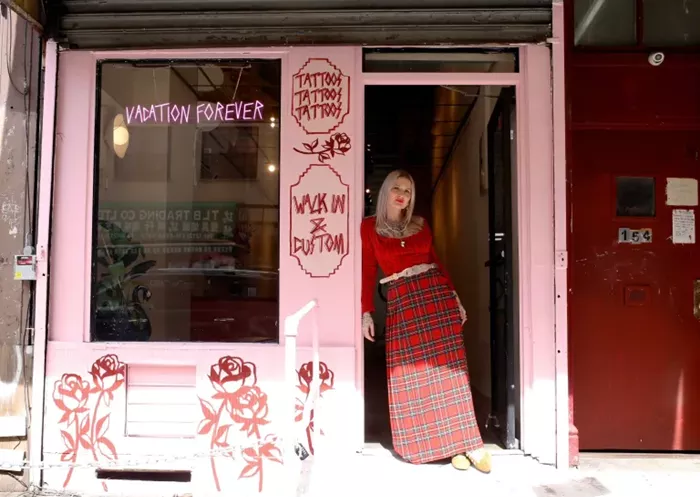In the bustling world of tattoo parlors, a quiet revolution is underway. Queer women are reshaping the traditional tattoo studio environment, creating welcoming, inclusive spaces that prioritize respect and comfort over the usual macho, intimidating atmosphere.
One such space is Haven Tattoo Studio in Brooklyn, New York, a queer women-owned establishment that serves as a safe haven for those seeking a tattoo experience that aligns with their identity. The studio, owned by Jes Valentine and Cameron Cox, is intentionally discreet with its gray storefront and “Haven Clients Only” sign, providing a sanctuary where both artists and clients can feel secure. “We don’t have to deal with any bullshit,” says Cox, describing how the locked doors and controlled environment keep unwanted distractions out.
The interior of Haven is an explosion of color and fun—a stark contrast to the typical tattoo parlor’s cold, dark vibe. Clients walk into a vibrant, playful space complete with chandeliers, pink walls, a candy bar cart, and quirky bathroom decor featuring everything from a life-size skeleton dressed as an angel to a glittery pink dildo by the mirror. It’s a setting designed to make everyone, especially queer women and LGBTQ+ clients, feel at ease while getting tattooed.
This shift in the tattoo industry is more than just a change in decor. It’s about creating an environment where clients feel comfortable expressing themselves. As Rai Manning, a client at Haven, puts it, the studio is “welcoming and fun,” a far cry from the often aggressive, masculine vibe of traditional tattoo shops. This kind of environment fosters a level of openness and communication that is sometimes lacking in other spaces, particularly for women and LGBTQ+ people.
Tattoo artist Tiffany Lai works in a similar environment at her Bushwick studio, where she prioritizes listening to her clients’ needs and ensuring they feel comfortable. “In traditional spaces, they don’t feel as comfortable speaking up for themselves,” Lai notes, describing male-dominated tattoo shops as “heavy and scary,” where clients, especially women, often feel pressured to remain silent.
For many, the oppressive atmosphere of male-dominated tattoo studios is alienating. Janina Klahold, a tattoo enthusiast, recalls feeling “awkward” and “out of place” in male-run shops, where she often felt her voice wasn’t heard. In contrast, queer and women-owned studios like Vacation Forever in Chinatown, Manhattan, offer a refuge from this hostility. Owner Kee Kee James goes out of her way to ensure that her clients feel respected and heard, offering breaks and soothing creams during painful sessions—something rarely offered in traditional tattoo shops.
The need for these safe spaces is further underscored by the prevalence of abuse and harassment in the tattoo industry. Stories of sexual assault and mistreatment are sadly common, and many victims, often women and queer people, face doubt or outright dismissal when they speak out. The creation of women and queer-led studios is a direct response to this culture. As Cameron Cox from Haven points out, the rise of queer spaces in the tattoo industry is not just a trend—it’s a necessity, especially as marginalized groups continue to face broader societal challenges, like the rollback of reproductive and trans rights.
Beyond just offering tattoos, these shops are becoming community hubs where people can find support, solidarity, and belonging. Vacation Forever hosts events like drink-and-draw nights, art exhibitions, and open mic nights that invite everyone, tattooed or not, to join in the celebration of queer culture. Kee Kee James explains that her studio offers “a different kind of support and a different kind of inclusivity,” providing a space where queer people, who have often faced exclusion in their lives, can feel seen and heard.
For clients like Frankie, who identifies as queer, having a tattoo artist who understands their struggles is key to a positive experience. “I want it to be somebody who gets me,” Frankie says, emphasizing the importance of working with someone who shares similar experiences and perspectives. The relationship between client and artist becomes more than transactional—it’s about mutual respect, empathy, and shared identity.
As more queer women and LGBTQ+ artists take the reins and open their own studios, the tattoo industry is slowly but surely becoming a space where everyone can feel welcome, safe, and celebrated. The work of studios like Haven and Vacation Forever not only challenges the traditional norms of tattoo culture but also fosters a sense of empowerment, allowing clients to reclaim their bodies in a space that respects and affirms their identities.
Related topics:

